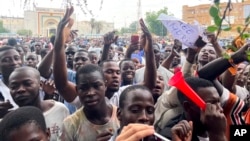Leaders of Niger’s army have declared their support for Wednesday’s overthrow of President Mohamed Bazoum, defying calls from abroad to respect the rule of law and the country’s democratic order.
The whereabouts of Bazoum remained unclear Thursday, one day after a group of soldiers from the presidential guard detained him at the presidential palace and later announced his ouster on state television.
The army, in a statement released to social media, said it had decided to back the coup to prevent “a deadly confrontation” that could lead to a “bloodbath” in Niger.
The streets of the capital, Niamey, remained calm. VOA’s French to Africa service reports a group of demonstrators gathered Thursday to support the new military junta, with some waving Nigerien and Russian flags.
Speaking to reporters in New York, United Nations Secretary-General Antonio Guterres urged coup leaders to return the democratically-elected Bazoum to power.
“I want to speak directly to those detaining him,” he said. “Release President Bazoum immediately and unconditionally. Stop obstructing the democratic governance of the country and respect the rule of law.”
Guterres expressed worry about the instability plaguing West and Central Africa.
"If you look at the region, you have a dramatic increase of terrorist activity in Mali, Burkina Faso, in Niger and coming closer and closer to the countries of the coast,” he said. “You have military regimes in Mali, Burkina Faso, now eventually in Niger. A fragile transition in Chad, and a horrible situation in Sudan. So we are witnessing that the whole belt south of the Sahara is becoming an extremely problematic area with terrible consequences for their populations and for peace and security in the African continent and further afield.”
The presidential guard members who seized power suggested Niger’s insecurity was a reason for their actions.
“We, the defense and security forces … decided to put an end to the regime,” said Colonel Amadou Abdramane, shown seated and flanked by nine other officers wearing fatigues, reading a statement. His statement mentioned “the deteriorating security situation and bad governance."
Abdramane said all institutions of the republic were suspended, that the country's borders were closed, and a nationwide curfew declared.
The soldiers warned against foreign intervention and said they would respect Bazoum’s well-being, Reuters reported.
In a message posted Thursday to the social media platform X, formerly known as Twitter, Bazoum said democracy would prevail in his country. “The hard-won gains will be safeguarded,” he said.
U.S. Secretary of State Antony Blinken told reporters Thursday in New Zealand that he had spoken with Bazoum and “made clear that the United States resolutely supports him as the democratically elected president of Niger.”
The Economic Community of West African States, ECOWAS, has condemned the events in Niger and called on what it described as coup plotters to free the president “immediately and without any condition.”
The ECOWAS statement vowed to hold those involved in the plot responsible for the safety of the president, his family, members of the government and the general public.
Others condemning the apparent coup attempt included the chairman of the African Union commission, Faki Mahamat, and former colonial power France, which has about 1,500 soldiers in Niger helping the government battle Islamist militants.
Abdoul Aziz Garba Birimaka, Niger's presidential special security adviser, told VOA’s French to Africa service the main question is what led to the attempted coup.
“Indeed, that is the question: What led us to this extreme? What is happening? Why? … How could all this have happened without any suspicions as we learn that someone who is supposed to protect is now holding you (against your will),” Birimaka said. “Those are many questions that remain unanswered for the moment."
The West African state is one of the region’s most unstable. If successful, Wednesday’s coup would be the fifth military takeover since the country won independence from France in 1960.
Michael Shurkin, a senior fellow at the Atlantic Council, told VOA, “President Bazoum has been one of the most effective leaders in the area, if not the most effective leader. He's somebody who by many standards is doing all the right things in terms of trying to deal with the country's vast problems and working effectively with Niger's many Western security partners, including France and the United States.”
He said, “A coup removes from the region a democratically elected and effective civilian official, replacing it with, first of all, a necessary period of uncertainty as the Nigeriens have to figure out what to do and make all the next steps. … Also, it's a huge blow to the West, which has really been turning to (Niger) to presume that sort of like it's its last effort to try to shape events in the Sahel as the Sahel otherwise has been swirling down the drain.”
VOA’s Carol Van Dam Falk, Margaret Besheer and French to Africa service contributed to this report. Some information came from the Associated Press and Reuters.






